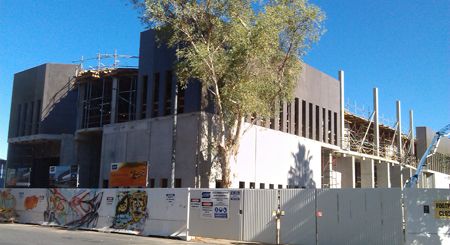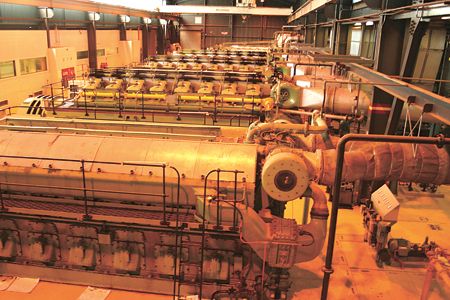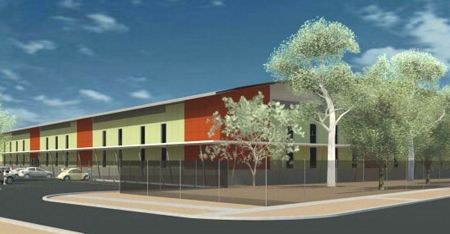Town Council advisory committees, in name only?
3 April 2016
Archived article
 The Town Council has a Development Committee and can nominate two members for the Development Consent Authority – but it cannot tell them how to vote. It has a Tourism, Events and Promotions Committee but is no longer represented on the board of the industry lobby, Tourism Central Australia (the council has protested about being excluded). The Sister Cities Committee hasn’t met in 12 months. And which committee should have stopped the monstrosity of the Supreme Court building (pictured), bringing the focus on crime even closer to the heart of the town?
The Town Council has a Development Committee and can nominate two members for the Development Consent Authority – but it cannot tell them how to vote. It has a Tourism, Events and Promotions Committee but is no longer represented on the board of the industry lobby, Tourism Central Australia (the council has protested about being excluded). The Sister Cities Committee hasn’t met in 12 months. And which committee should have stopped the monstrosity of the Supreme Court building (pictured), bringing the focus on crime even closer to the heart of the town?
REPORT by ERWIN CHLANDA
The Alice Springs Town Council runs or participates in 35 advisory committees or sub-committees, providing the town with wisdom sprouting from people in tune with the community.
And these committees also give the NT Government somewhere to go to on all issues, to discover what the locals want their government to do for them.
None of that could be further from the truth, as a look at some major current NT Government projects reveals.
These have been in the planning stage for a while, so we spoke to the people chairing the relevant committees prior to the new appointments were made by the council last week.
The mother of all the projects is the $75m power station, to be entirely driven by non-renewable gas, while the region is blessed with a renewable solar power resource that is the envy of the world.
We have a string of local experts who could put that asset to good use. We are an erstwhile solar city with a public that has – so far – put 700 solar generators on its roofs.
 One would have expected it to be a no-brainer for the NT Government looking to replace the Ron Goodin powerstation (pictured) to get the Town Council’s Environment Advisory Committee into the loop. Did the NT Government do that?
One would have expected it to be a no-brainer for the NT Government looking to replace the Ron Goodin powerstation (pictured) to get the Town Council’s Environment Advisory Committee into the loop. Did the NT Government do that?
We asked last year’s chairman, Cr Eli Melky: No, the NT Government didn’t contact his committee, not directly, nor through the council’s elected members.
Behind closed doors planning for the $75m project have so incensed prominent local environmentalists that they are now in the process of forming a new solar power pressure group, “wanting to revive the excitement for solar,” as one of them puts it.
They say a portion of the money could have been diverted to solar which is on the brink of a leap forward with the development of storage batteries whose predicted huge drop in price will bring solar much closer to providing base load power.
The NT Government’s decision was made to guarantee that peak demand can be met at any time. Not only that, it has two generators up its sleeve, just in case two of them break down.
Is that a minor advantage achieved at an immense cost?
Peak demand, some 55 megawatts (MW) is rare – a few hours a year. Normal demand, around 25MW, can of course be met by far fewer generators, costing less money.
There were at least two options: To spend all the money on a plant that relies entirely on gas.
That is what the government has chosen, committing the town to fossil fuel dependence into the distant future.
The second option would have been to spend part of the budget on solar, putting consumers to minor inconvenience on extremely rare occasions, for a limited time.
Yet in a few years, given the predicted progress in solar power, the town would be on the vanguard of environmentally friendly power generation that is able to supply peak demand.
That option, sources in the solar power and environment movements insist, is still alive: Work on the new facility hasn’t started, and all contracts have escape clauses. The Alice Springs News Online asked the government for a copy of the contract but this has been declined.
Inconvenience resulting from this Plan B would be by no means arduous: It would perhaps mean, for a few hours a year, on extreme weather days, running your air conditioners in three rooms instead of five, or for part of a day suspending heavy industrial power use.
Has the public been given a choice of these options? And have they been explored through the dense network of committees? No, not so far, anyway.
Territory Generation (TG) – 100% NT Government owned – said in a statement to the News: “It is TG’s view that any further large-scale solar developments without some form of storage also being installed would have a detrimental impact on the reliability of power supply under the current power system configuration.
“As a result, the expansion of Owen Springs Power Station is required to provide cost effective stable base-load power to Alice Springs.
“TG has an obligation to generate electricity at a price that is acceptable to consumers. If TG was to implement solar technologies combined with storage on a utility scale across Alice Springs, this would cost electricity consumers more than they are currently willing to pay.”
TG could not point to any survey or study that would support this assertion about the public’s attitude.
TG gave the same response – again without supporting evidence – when the News put to it the scenario of Plan B.
In fact the public, including the council’s Environment Advisory Committee, had no idea about the $75m project until the News broke the story on February 2 this year. Its official announcement, starring Adam Giles and Country Liberal candidate / Town Councillor Steve Brown, came three days later.
“I cannot recall being approached by NTG throughout that process,” says Cr Melky, as chair of the Environment Advisory Committee.
Democracy had had another black day.
TG, clearly aware that it has a problem on its hands, will give a presentation to the Town Council on April 11. (See separate report.)
While the Town Council’s efforts on the environment front are hampered by being sidelined, its problem with sporting facilities and policies is fragmentation. The council’s Sports Facilities Advisory Committee (SFAC) deals with some sporting facilities only, unable to identify overlaps and opportunities for sharing.
There is a pressing need for a single go-to in the planning and management of sport by the town’s local government. But in a domain rich in opportunities for pollies to make a good fellow of themselves, this may remain a bridge too far.
The NT Government’s draft masterplan on sport was open for comment until two days ago.
 Yet Mr Giles, in the Municipality of Alice Springs, had already spent $1m of public money on the Centre NATS (at right); he had proposed a running track at Head Street Oval (in his electorate) and then changed his mind; he had committed $1.8m for a wall around the track of the speedway complex, thereby firmly cementing a highly spectacular but very noisy sport into a residential suburb; and he became enmeshed in the messy planning of a netball stadium.
Yet Mr Giles, in the Municipality of Alice Springs, had already spent $1m of public money on the Centre NATS (at right); he had proposed a running track at Head Street Oval (in his electorate) and then changed his mind; he had committed $1.8m for a wall around the track of the speedway complex, thereby firmly cementing a highly spectacular but very noisy sport into a residential suburb; and he became enmeshed in the messy planning of a netball stadium.
Announcing the final $6.25m four-court version the Chief Minister was described as the “incoming local Member for Braitling” in a media release written by a minder whose salary is paid not by the Country Liberal Party, but by the taxpayer.
All the while SFAC, according to its long serving chairman Bruce Walker, had no input into the Desert NATS (for which Mr Giles later presented clearly massaged attendance figures, in claims that the event was hugely successful). Speedway “is not a member of the Trust Fund” and as such not in the purview of SFAC, says Dr Walker.
The shemozzle around Blatherskite Park, where several sports are based, is outside the SFAC charter. The Blatherskite Trust president has resigned and won’t comment.
The large, publicly owned facility has lost significant income when it shut down its budget-priced caravan park, apparently under pressure from a privately owned caravan park. This has led to increases in fees which resulted in the Finke pulling out its scrutineering of competing vehicles. Even the iconic annual show has been reported to be under threat.
Dr Walker says: “SFAC have long recognised the limitations of land availability within the current town boundaries for future sporting complexes. In this context there have been many discussions about Blatherskite Park.
“However the governance and land tenure of Blatherskite Park make it initially an NT Government issue as council have no control of that land.”
Are there any moves to bring some logic into this situation? After all, it is public land, under the control of the NT Government, and so a transfer of Blatherskite Park to the council would be a mere formality. SFAC would become involved if instructed by the council, says Dr Walker.
He says the charter of SFAC “confines it to council owned and operated facilities” excluding the pool (although it is owned by the council). He says the pool is a historical exclusion because it had its own council sub-committee at the time of its construction and has since been operated as a council business unit.
The town’s biggest event, the Finke, as it is not operating from council owned property, is also not covered by SFAC’s charter, and neither are the speedway, the drag way, the turf club and the squash courts.
Says Dr Walker: “For balance there is a provision for two non SFAC trust positions to be filled by non trust sports that might be using these facilities. Currently these members come via darts and the Finke Desert Race team. In the past we have had people from squash and the turf club.”
Firmly in the SFAC fold are basketball, tennis, netball, cricket, AFL, baseball, rugby league and union, roundball football (aka soccer) and softball.
The council, in Dr Walker’s view, “deals with sports facility planning very well although sports that do not use council owned facilities do not form part of the SFAC charter”.
This, of course, makes a coherent, co-ordinated planning and management of sporting facilities throughout the town difficult if not impossible.
The obvious questions are: Should the charter be changed, or should the councillors refer all sporting matters – whether on council land or not – to the SFAC for advice, as they can do?
“Decisions by the NT Government to fund capital developments are taken by government, not council,” says Dr Walker.
“Council however are left with the responsibility of maintaining facilities once erected on council owned land. In this context council often views the gift of capital investment through different eyes to government.”
On the bright side, SFAC oversaw the development of the Alice Springs Sporting Facilities master plan for the Alice Springs Town Council and “as such it is a roadmap document for SFAC and council and a standing item on the SFAC agenda,” says Dr Walker.
“The draft NT Masterplan endorses the ASTC Masterplan future priorities.
 “In relation to the netball facility the ASTC Sports Master plan identifies the need for an indoor netball facility (at left) so it has firmly been a part of the SFAC agenda. However, without specific funding till now the location and design of that facility had been discussed but not decided. That detail is negotiated between Council officers and NTG.”
“In relation to the netball facility the ASTC Sports Master plan identifies the need for an indoor netball facility (at left) so it has firmly been a part of the SFAC agenda. However, without specific funding till now the location and design of that facility had been discussed but not decided. That detail is negotiated between Council officers and NTG.”
Meanwhile the Territory draft plan says Alice Springs has “recognised the need for feasibility studies for a number of proposals including: Hockey fields, athletics track and a tennis centre.
“Main priorities were a multi-purpose floodlit synthetic sports field [and] providing a second rectangular competition field; multi-purpose indoor sports centre; land for sport in Kilgariff Estate and Master planning Blatherskite Park,” says the draft plan.
UPDATE April 4, 4pm:
Tourism Central Australia CEO Stephen Schwer provided the following request for a “correction” today: “Alice Springs Town Council, according to the Tourism Central Australia Constitution, has an ex-officio position on the board (titled a ‘Stakeholder’ position).
“Alice Springs Town Council have declined the offer to take up this ex-officio position, however as per our constitution it is there should they choose to take it up at anytime in the future.
“So to state that council has been excluded from TCA is incorrect as they have an ex-officio position on the board, just as Tourism Northern Territory and the Parks and Wildlife Commission NT do.”
The Alice Springs News Online stands by its report. As Mr Schwer points out, the council is no longer represented on the board. The council had a position on the board with full voting rights. That was withdrawn by the TCA in November last year.
Cr Steve Brown, who was the Deputy Mayor at that time, says he considers this as a slight, given the council’s extensive involvement in the industry, through providing locations, facilities, services and support of events.
He says he has no interest in a position as an observer without a say in decision making.
The council’s decision not to take up an “ex-officio” position appears to make it clear that the majority of the councilors agree with him.



Yes advisory committees or sub-committees are just token, cardboard cutouts in Alice Springs.
Even worse some important NT Government environmental agencies are as well.
Take the NT Pollution Hotline.
For months a black oily substance has been seeping into my backyard from leaking drums next door.
Hotline action?
Massive resistance to doing anything, I was told they are a reporting agency and too busy with paperwork to take action.
I was reassured that “Darwin knows about it”.
Eventually they contacted the owner of the drums but he didn’t pay any attention to them and the pollution continues.
I wouldn’t bother getting back to the Pollution Hotline and advise others to not bother.
When shall we have a master plan for the development of Alice Springs that looks into the future, some 10 to 25 years from now?
A pleasant town, aesthetically harmonious, for people to live in, not only tourists and sport visitors. An innovative plan that includes science and technology.
A plan for a remote rural regional town like Alice with 300 days of sunshine per year, where people will come, love and stay!
So far the NT Government is committing my taxpayer’s dollars into bandaids to the immediate needs (gas-fueled) power station, larger sporting venues for the Masters Games, wartime bunker-house for a new Supreme Court adjacent to the heritage Residency! What next? Where is the master plan?